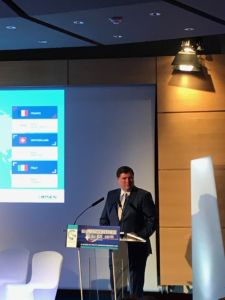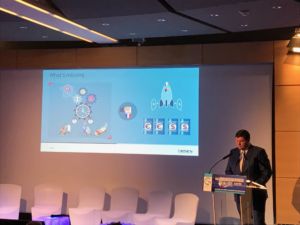“How France can leverage its attributes and deliver on its full potential” David Meek’s address 7th Series of G5 Santé
Prior to joining Ipsen in 2016 as Chief Executive Officer, I lived in a number of countries around the world including the United States, Italy, Switzerland and Canada. In each country, I held various global executive positions at pharmaceutical powerhouses such as Janssen and Novartis, as well as small, innovative biotechs like Endocyte. I’ve gained a wealth of great experience over the last 25 years and I consider myself a true citizen of the world.
My experience so far has given me considerable understanding of the mind-set and internal dynamics across a number of markets. Now, as an American CEO of a leading and fast-growing, global biopharma company headquartered in Paris, my knowledge and understanding continue to evolve. And believe me, I’ve learned a lot over the last two years.
As I look back, one of the most significant things I’ve learned is that the United States and France are much more similar than we think. Each country, while entrenched in its own rich history and heritage, also shares the same history as natural allies. Despite this long-standing partnership, we’re constantly looking for ways to improve our relationship and learn from one another.
Today, everyone in this room is driven by a common purpose: to improve the quality of life of patients with high unmet medical needs.

We have a tough fight ahead of us – the war on cancer being a significant part of that fight. And I firmly believe that we’re stronger when we work together.
The G5 represents all aspects of the healthcare industry, including medical devices and diagnostics, but my talk this morning will focus primarily on the biopharmaceutical sector. Specifically, I’ll speak to the current state of France’s biopharmaceutical ecosystem, as well as areas where drastic improvement is needed if France wants to grow as a global player. Finally, I’ll share my thoughts on the future outlook of France’s biopharmaceutical industry as a whole.
 As the world’s sixth largest pharmaceutical market and a country with easily accessible universal healthcare, France’s pharmaceutical industry is poised to play an even greater role on the world stage.
As the world’s sixth largest pharmaceutical market and a country with easily accessible universal healthcare, France’s pharmaceutical industry is poised to play an even greater role on the world stage.
According to a study published in November 2017 by the Boston Consulting Group and France Biotech, French Health Tech could potentially create an extra 130 thousand jobs by 2030, raising the healthcare sector to almost 2 per cent of the French labor force.
France possesses many of the required elements to emerge as a European and global epicenter of Health Tech. The country has an excellent reputation for basic scientific research with vibrant clusters around Paris-Saclay, as well as competitive hubs like Medicen and Lyon Biopôle.
France is a country with proven scientific and academic excellence in many areas related to life sciences. Evidence of this lies in the numerous French Nobel Prize and Fields Medal winners ‒ the country is respectively ranked fourth and second for these two honorable distinctions.
France boasts several prestigious engineering universities including École Polytechnique and École Centrale. It also has world-renowned medical and pharmaceutical universities.
For example, I visited the Imagine Institute at Necker Hospital here in Paris and I was very impressed. It’s a great example of how public and private research can work together to address unmet medical needs and create value. And I could also say a lot of positive things about the Institut Gustave Roussy, a very famous research institution in the field of clinical oncology.
In addition to academic excellence, France is also known for the caliber of its research and global expertise housed in agencies such as the French National Center for Scientific Research (CNRS), INSERM, the Atomic Energy Commission (CEA) and many university hospitals.
France has the possibility to grow significantly stronger with the recent policy change brought forward by President Macron and his team. Recent amendments to existing employment law are a very real and much welcome change, as are recent tax measures and health reform announced by President Macron in September. This health reform will foster a much closer interaction between general and hospital practitioners and this is a positive thing.
However, all of these elements and even better can be found in other countries and are not optimized if they’re not part of a broader health ecosystem. If we don’t improve where change is needed, others will continue to pass us by. We must act together, and now – the world will not wait for France!
There have been significant barriers removed in the US, Europe and China to fast track innovation to patients. The US created the breakthrough therapy designation; the EMA launched PRIME to enhance support for the development of medicines that target unmet medical needs and China’s FDA is creating a fast lane-approval pathway to speed certain categories of drugs to market.
It’s clear to me that to best leverage France’s existing pharmaceutical ecosystem and deliver the most value to patients we need faster access for patients to innovative products, and additional regulations and financial support to a more and more challenging clinical development process.
As I’m constantly reminding my teams at Ipsen, patients don’t have time to wait. While there’s no doubt France excels in the area of fast access to innovation for patients, there’s so much more we can do. For example, measures such as the Temporary Authorization for Use strongly benefit select patients by authorizing the exceptional use of a drug that has not yet been approved. Established measures like these should be well reinforced and expanded especially when submitting a new indication for a drug.
The current timing to market access for innovative products is just too long in France, compared to the United States and other European countries. Here, it’s an average of 530 days, which is well above the 180 days in the European Directive and far longer than the 66 days in the UK and 45 days in Germany. We can and must do better than this for patients!
Another area for improvement is the need to significantly boost the innovation pipeline by fostering a holistic ecosystem for start-ups and biotechs. While start-ups in the biotech space benefit from robust early-stage funding, additional investment is clearly lacking from VCs.
In fact, France ranks third in Europe for venture capital funding. As a result of this, many companies leave France for the US to secure additional funding. This is a big problem and one that threatens our place on the world stage as a global pharmaceutical player.
Like other innovation-driven companies, Ipsen provides capital for start-ups and biotechs. For example, we recently invested in InnoBio 2, following our investment in the InnoBio 1 venture capital fund in 2009.
That said, this is not enough. The industry needs a better partner in the government. The French government should be more-forward looking to drive an innovation agenda to create a sustainable ecosystem and to improve healthcare. The governments around the world play an important role in the ecosystem.
Governments should be asking stakeholders what other countries are doing to accelerate the process of becoming an innovation hub. What more can this country do to help us bring new innovative therapies to patients?
In the US for instance, it’s becoming standard practice to create industry panels that have a cross-section of industry, FDA, payers, academia and advocacy. And I’ll give you a very concrete example of this. On October 11th, we had the pleasure of opening the doors to our expanded US headquarters in the heart of the Massachusetts biotech cluster, Kendall Square and welcome over 120 members of the local life sciences community to the Ipsen Partnering Day. Our goal was to share our vision, strategy and focus on external innovation with potential future partners. The event was co-hosted by the Massachusetts life science trade association, MassBio and attendees included biotech leaders, venture capitalists, academia, university technology transfer offices and other members of the biotech community.
The infrastructure in France differs from the one in the US. Although one could argue that it’s the ambition of Paris-Saclay to be a world-class biopharma hub combining academia, biotech and VCs. This is a right first step but beyond infrastructure, we need to adopt an ecosystem mindset. A healthy ecosystem requires us all to share common goals and partner to feed the innovation agenda.
I think there’s an outdated cultural mindset that doesn’t see the value of a healthy ecosystem. Rather, it claims that research is produced using public funding, then privatized and sold back to the public making massive profits for private companies.
I also want to highlight the outrageous amount of red tape related to clinical development in this country. One of the objectives of the Strategic Council for Healthcare Industries (CSIS) is to accelerate the clinical trial authorization timelines and reduce the lead time to market.
On the positive side, there are many things we can do to improve and build a strong cross-functional ecosystem similar to what we see in markets like Boston, San Francisco, and Shanghai.
As an American in Paris and the leader of Ipsen, I’ve made it both a personal and professional commitment to work with the French and Boston biopharma communities. I was a speaker at the first two Paris Boston Biotechnology Summits, the first at the Pasteur Institute and the second in Boston last June.
I believe we can all learn from one another and that this kind of exchange with world-class biotech communities can fuel France’s leadership to deliver innovative therapies and improve patients’ lives.
Our remit is to make patients our priority. This is where our government needs to step in as a trusted partner to help achieve this on our own ground first. If we can deliver on this, my outlook for France on the global stage is optimistic.
And it would appear the stars are aligning…
This July, the CSIS highlighted the strategic importance of the healthcare industry for the French government. I followed this with great interest. For me, this meeting stood apart from the rest as its vision is clear: to regain France’s global healthcare leadership position. However, the recent announcement regarding new savings of about 2 billion euros on healthcare products is not the way forward. This is detrimental to the innovation industry and its capacity to maintain a fertile environment.
The G5 wants to play a key role in monitoring the CSIS measures and to measure its effectiveness. We’ll provide continued support to Jean-Luc Bélingard, Chairman of the Healthcare Industry Strategic Committee (CSF Santé) and Head of the CSIS Monitoring Committee.
In the current Brexit environment, we’re well placed to reposition the role and remit of the French National Agency for Medicines and Health Products Safety (ANSM). Brexit has sidelined the United Kingdom. Its leading role in new drug evaluation in Europe has collapsed.
Consider this: in 2016 the UK evaluated 22 European applications, positioning it top of the European ranking. In 2017, that number shrank to a mere 6. So, there’s a clear opportunity to position ANSM in Europe.
France’s leading scientific expertise means it has the potential to fill the global leadership spot in Health Tech.But, we all must adapt beginning now.
I have clear and active ambitions in this area and will continue to build bridges across the global biopharmaceutical ecosystem. Increasing priority will be placed on the areas where Ipsen has existing R&D centers such as Paris-Saclay, Oxford in the UK and Cambridge in the US.
Two years ago, I joined Ipsen to steer the Group’s transformation into a global, specialty pharmaceutical group. So far, our efforts have been overwhelmingly successful. Not only are we expanding our global footprint with three hubs in France, the United States and the United Kingdom, but we’ve achieved therapeutic leadership in our target areas – oncology, neuroscience and we’re well positioned to expand in rare diseases.
Our future is bright.
With France’s rich pharmaceutical ingredients, we have great potential for leadership in innovation. This is a market that enjoys outstanding underlying fundamentals and, as such, France remains an attractive location for the entire industry. The big question for France moving forward however, is how the country can leverage these attributes and deliver on its full potential.
Innovation comes from all directions and companies have to be open to ideas from across the world. Furthermore, collaboration between industry, patients, governments, researchers, payers and other key stakeholders across the patient care continuum is even more critical as health systems battle financial constraints. This can only be remedied by working in unison.
After all, we’re stronger when we work together.
Before I close today, I ask that the public authorities act as a strong partner for a flourishing biopharmaceutical industry for the greater good of patients. Ipsen is a proof point that mid-size companies can blossom into true international players if the environment is favorable.
But let’s not kid ourselves. Ipsen is a 90-year-old global biopharma with a growth agenda. And as for every other player in our industry, we have to make capital allocation decisions on a daily basis. We risk shareholders’ capital in a business with a high failure rate, despite patients wanting and needing us to succeed. It’s for that very reason that we will invest in markets that have favorable and predictable environments to drive an innovation agenda. Patients do not have time to wait.
David Meek, CEO of Ipsen, October 23rd 2018.
Keynote speaker – 7th Series of G5 Santé
